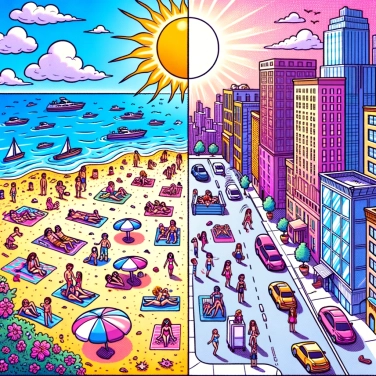Sometimes it is hotter at the beach than in the city because the sand absorbs the sun's heat more effectively than urban surfaces that retain heat. Additionally, the sea breeze can help slightly cool the air at the beach.

Albedo is basically the ability of a surface to reflect sunlight instead of absorbing it. Light beach sand has a lower albedo than the concrete surfaces of cities: concretely, this means it absorbs more solar heat and reflects less back into the air. As a result, under direct sunlight, sand quickly accumulates heat, raising the perceived temperature when you walk barefoot on it. In contrast, concrete, although it also heats up, reflects a greater portion of solar rays, which slightly limits its heating compared to sand. This is why a sunlit beach can sometimes feel warmer than a nearby concrete street.
At the beach, sea breezes play a key role in the perceived temperature. During the day, the sand heats up quickly, warm air rises and creates a low-pressure zone. As a result, cooler air from the sea is drawn towards the coast: this is the famous sea breeze, cool and pleasant. However, when this weak or non-existent sea wind is not enough to cool things down sufficiently, you feel even hotter due to the still air. In the city, air circulation is often slowed down by buildings, and the wind, sometimes trapped, does not allow for such quick or pronounced cooling. Depending on the intensity of the sea breezes, the beach can thus offer either a pleasant coolness or, on the contrary, an increased feeling of suffocation when these currents disappear.
Each material stores heat differently. For example, sand heats up very quickly in the sun because it has a low thermal capacity: it takes little heat to raise its temperature. In contrast, in the city, streets and buildings made of concrete or asphalt heat up more slowly, but they store heat better and release it slowly. As a result, in the mid-afternoon, one often feels intense heat on the burning sand, while the heat absorbed by the sidewalks in the middle of the city only becomes truly stifling at the end of the day, once the heat is slowly released.
On a beach, the absence of trees or tall vegetation limits natural shade. As a result, the entire area receives maximum sunlight continuously throughout the day. In the city, you have buildings, trees, and other structures that regularly provide shade. Consequently, on the beach, the sand heats up faster and intensely radiates its warmth all around, quickly creating the impression of stifling heat. Without shaded areas to break the heat, each grain of sand accumulates warmth, significantly increasing the perceived temperature even if the surrounding air remains similar to that in the city.
Contrary to a common belief, it is not the water itself that warms up first at the beach, but rather the sand, due to its relatively low thermal capacity compared to water.
Sea breezes, those gentle winds coming from the sea, occur mainly because the land heats up much more quickly than the water, creating a difference in atmospheric pressure that pushes the cool marine air towards the shores.
The albedo of a surface indicates the proportion of solar radiation that it reflects: light sand can reflect up to 40% of solar rays; however, it heats up more at the surface than dark urban concrete, as it retains little heat at depth.
The lack of natural shade at the beach greatly contributes to the heightened feeling of warmth: without trees or buildings, nothing blocks the direct rays of the sun or reduces their intensity.
At the beach, the lack of natural shade combined with the increased reflection of sunlight by the sand creates a more intense feeling of heat, even at the same temperature as in the city.
The sea breeze is an air circulation created by the thermal differences between land and sea. It can have a cooling effect during certain times of the day, but when it is weak or nonexistent, the temperature at the beach can feel higher than in the city.
Yes, urban materials such as concrete or asphalt absorb and store heat, but they also release it slowly. However, their different albedo and high thermal capacity mean that their temperature peak is often delayed compared to that of sand, which can sometimes lead to a perception of less heat in the city, depending on the time of day.
Sure! Here’s the translation: "Yes, bringing an umbrella to create shade, wearing light reflective clothing, and checking the wind direction to enjoy a refreshing breeze are all practical tips to reduce the feeling of heat at the beach."
Sand has a low thermal capacity, which means it heats up very quickly under sunlight, unlike water, which has a higher thermal capacity and therefore warms up much more slowly.

No one has answered this quiz yet, be the first!' :-)
Question 1/5